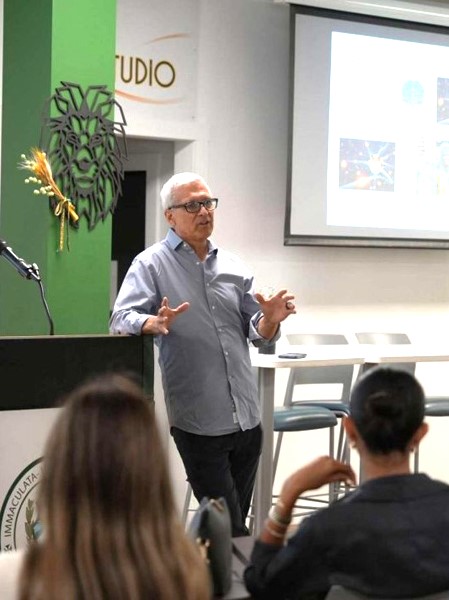By Florida Catholic staff - Florida Catholic
By Valentina Lanza

Photographer: COURTESY
Carl Wilkens, who experienced the 1994 genocide in Rwanda, speaks to students from Immaculata La Salle High School. Wilkens visited in April 2024.
MIAMI| Carl Wilken's traumatic, yet, moving first-hand experience with Rwanda’s 1994 genocide has heightened his devotion to humanitarian work and educating individuals on peace efforts. Wilkens visited Immaculata-La Salle High School in the Spring of 2024 to inform Applied Global Leadership (AGL) students of the recovery process preceding the devastating event in Rwanda.
In 1994, more than 800,000 people were killed and the country was left in shambles after an unexpected uprising of the Hutu ethnic group attacked Tutsi people because of the notion they were dangerous traitors. Since then there have been many alterations in their structure of government.
“Rwanda now provides opportunities for women to be powerful citizens enforcing change in their community. So much so, 60% of their government is women,” said Wilkens.
That statistic holds the weight of being the largest number of women involved in a country’s leadership. This growth is not a miracle but the result of many reforms to rebuild the nation in aims to prevent another massacre.
“Umuganda (a national holiday in Rwanda) gathers people in a positive light with the collective goal of restoring their community’s relationship and streets. It is a shared experience that is mandatory for civilians, including the president, to participate in every last Saturday of the month,” added Wilkens.
This law-required service day has been enforced to restore the atmosphere between diverse ethnic groups and promote the regrowth of their nation.
Throughout his lecture, Wilkens emphasized the importance of accepting and encouraging diversity amongst Rwandans in their restoration efforts. He views this element of their transformative process as most effective and vital to the changes being made in the country. Many civilians, like his friend Maria, embody this alteration through neuroplasticity, a medical and psychological term referring to a transition in the brain that allows for the brain's capacity to continue growing and evolving in response to life experiences.
“Maria has become close friends with the Hutu member, Filbert, who was involved in the murder of her husband and three sons. She so inspiringly has forgiven him and renders him a part of her family today. A majority of people would remain attached to the anger and affiliate him to such emotions, but she has found peace and paints him with positive feelings. A transition in the brain done because of neuroplasticity,” explained Wilkens.
Students who attended the conference were especially moved by Maria’s transition to peace despite the prior violent actions of Filbert on her.
“It is incredible to see her growth and how she has included Filbert into her family. I can’t imagine how hard that is to overcome,” shared Chloe Ruiseco, a junior at Immaculata La Salle.
The stories and progress of Rwanda shared illustrated to AGL students how collective efforts can truly affect a country, helping it recover from a tragedy, and make new advancements toward increasing peace among adversaries.
This is a slightly edited version of an article originally published April 18, 2024 in Immaculata-La Salle High School's student newspaper, The Royal Courier. The writer, Valentina Lanza, is now a senior who serves as opinion and podcast editor of the newspaper.

